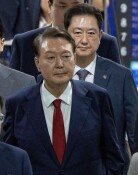Korea to Begin Talks on Opening Rice Market
Korea to Begin Talks on Opening Rice Market
Posted March. 28, 2004 23:29,
Australia has recently asked for a new negotiation table for rice, bringing up the issue of opening up Koreas rice market back to the surface after a suspension that began in 1995.
As rice accounts for half of Koreas agricultural income and is directly connected to Koreas food security, the negotiations are expected to be the most important agenda in agricultural administration this year.
-Negotiations must be over by the end of the year
At the 1994 Uruguay Round (UR), Korea was allowed to suspend duties on domestic rice for the next 10 years on the condition that Korea would increase its obligatory amount of rice imports each year. This agreement ends by the end of this year, making it inevitable for Korea to restart negotiations on opening the rice market.
The parties who have decided to participate in the negotiations, aside from Australia, are the U.S., China, and Thailand. If an agreement with the counter parties is not met by September, there is a large possibility that the rice market will automatically become dutiable. Some believe that taking trade dispute legal measures or extending the negotiation period is possible, but experts say that such scenarios are hardly likely.
-Is it justification or interest?
Korea will try to postpone imposing a customs duty on rice during the negotiations, as policies of dutiable rice, based on the preconditions of an open market, will surely bring severe opposition from the rice farmers.
It is expected that Korea will try to use a negotiation card that minimizes trade liberation in the negotiations with the contracting parties. Rather than beginning the talks with negotiations on customs duty, Korea will start discussing the suspension of imposing duties, in a move to somewhat weaken the negotiation power of rice exporting countries.
However, if Korea sticks to suspending duties, it is possible that when rice becomes dutiable eventually in the near future, rice exporting countries will demand tariff-rate quotas (TRQ), which will allow them to export more than the obligatory quantity. By giving Koreans the justification for suspending duties, other countries may be trying to guarantee their interest of more exports in the future. This possibility is what causes some experts to point out that imposing duties now would actually prove to be profitable in the long run.
Rice Exporters Same actions, different motives
The U.S. knows that Koreans have a good impression of California grown rice. As illegally distributed California rice from the U.S. army bases in Korea is known to be very popular among Koreans, the U.S. may expect to acquire a fair share of the rice market through trade liberation.
However, as U.S. rice is more expensive than Chinese rice, it is possible that the U.S. will ask for an increase in obligatory U.S. rice imports, rather than imposing customs duties. China is expected to request customs duties, as Chinese rice will have an advantage in price, since the transportation and production costs are lower than that of the U.S. or Australia.
Australia may ask Korea to increase Australian imports of beef and wheat, in exchange for leniency in liberalizing the rice market.
Jin-Hup Song jinhup@donga.com







